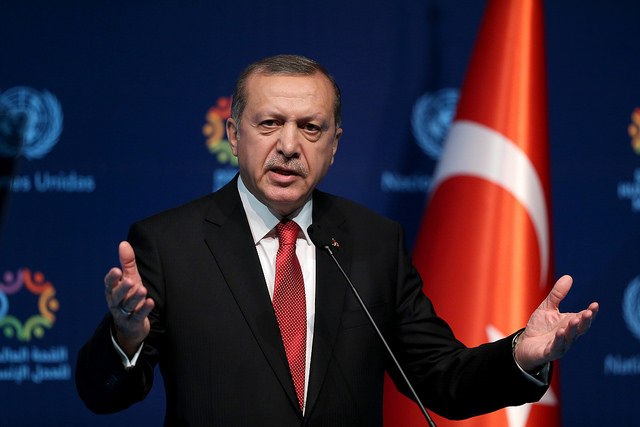
ANKARA, Turkey — Turkey’s president on Wednesday made the incendiary claim that the Greek authorities’ alleged mistreatment of migrants at its border was comparable to “what the Nazis did,” and said he would denounce Greece’s action at international platforms.
In his weekly address to his ruling party’s legislators, Recep Tayyip Erdogan also said there would be no change to his government’s policy of allowing migrants to cross into Europe, until the European Union fulfills obligations set out in a 2016 Turkish-EU deal that helped stem a migrant crisis.
Thousands of migrants massed on Turkey’s border with Greece, after the Turkish government said last month that it would no longer try to contain migrants on its territory.
To prevent the crossings, Athens deployed riot police and border guards who in many cases used tear gas, flash grenades and water cannons. Several clashes have erupted between the migrants and the Greek forces. Greece says that Turkish security forces fired tear gas from the other side of the border at Greek officers.
Erdogan said Greece’s actions have resulted in four migrants’ deaths and that around 1,000 were injured. Greece denies accusations of mistreatment.
“There is no difference with what the Nazis did and the images from the border with Greece,” Erdogan said. “To open fire, fire tear gas and use boiling water on innocent people whose only aim is to save their lives and build a better future for their children is barbaric in the true meaning of the word.”
Under the 2016 agreement, the EU offered Turkey up to 6 billion euros ($6.7 billion) in aid for the Syrian refugees it hosts, fast-tracked EU membership as well as a revision of Customs Union agreement.
“We will continue the current (open borders) measure on our borders until all of our expectations are concretely met,” Erdogan said.
In Athens, Greek government spokesman Stelios Petsas said Erdogan was “constantly trying to undermine the climate with such kinds of statements.” He quoted Greece’s Jewish council as saying the situation had nothing to do with the Holocaust.
“Greece … does not accept lessons in human rights and the respect of international law from the Turkish president,” Petsas said, accusing Turkey of engaging in “an organized and co-ordinated operation.”
“We continue to do our job. Our job is the protection of the Greek and the European borders,” Petsas said. “We are saying to everyone that they mustn’t try coming in through the window. There is a door. Whoever is entitled to protection can knock on it and receive the protection they are entitled to by international law. But they will not enter through the window.”
Petsas also said the Turkish ambassador to Greece had been summoned to the foreign ministry, after Greece’s coast guard said Wednesday that a Turkish patrol boat deliberately attempted to ram a Greek patrol boat in Greek territorial waters near the island of Kos. The collision caused minor damage to the Greek vessel, and there were no injuries, the Greek coast guard said.
Meanwhile, additional forces arrived from Cyprus, Austria and Poland to help Greece patrol the border with Turkey, said Panagiotis Charelas, head of the Greek Federation of Border Police.
“For us that means a great helping hand and great strength that we draw from this support, finding colleagues from other European countries next to us,” he said.
Erdogan’s comments came days after he travelled to Brussels for talks with top EU officials after which the sides agreed that teams headed by EU foreign policy chief Josep Borell and Turkish Foreign Minister Mevlut Cavusoglu would review the 4-year-old migration deal.
Cavusoglu said Tuesday the teams would try and come up with a “road map” in time for a EU summit on March 26.
The global humanitarian aid group, Mercy Corps, meanwhile criticized the Turkish-EU deal as “fundamentally flawed” and said the dispute was an opportunity “to revisit how we treat those fleeing conflict.”
“A `solution’ that closed off borders, and options, to refugees should never have been hailed a success,” said Selena Victor, Mercy Corps’ Senior Director of Policy and Advocacy. “The cost of the deal was tens of thousands of lives in limbo in Greece, profound stress, ongoing trauma and a loss of hope.”
“We have an opportunity to choose a path of dignity, humanity and compassion. Halting the asylum process and holding fleeing families back with water cannons is not the answer,” she said.
The Turkish president has in the past also compared other European countries, notably German and the Netherlands to Nazis, sparking tensions with these nations.
———
Associated Press reporters Elena Becatoros in Athens, Greece, and Costas Kantouris in Kastanies, Greece, contributed to this report.